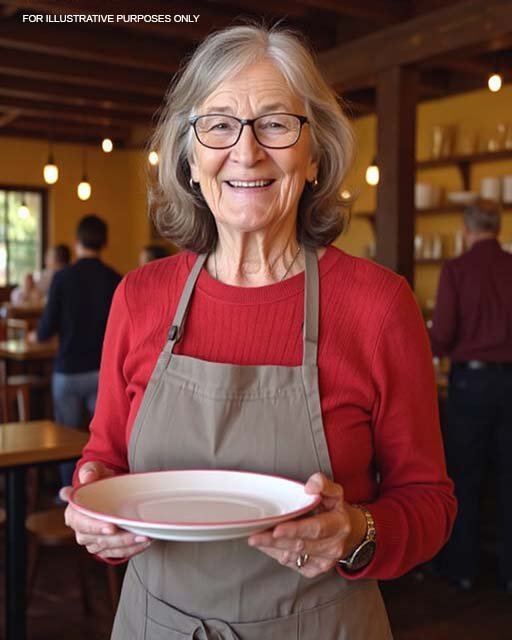My mother has always been the kind of person who sees light in everyone, even when there’s barely a flicker to be found. She’s sixty-two now, with silver threads running through her dark hair and a posture that tells the story of decades spent on her feet. For the past twelve years, she’s worked as a waitress at a small café on the corner of Elm Street, a cozy place with green-painted walls, a bell that jingles whenever someone walks in, and the smell of butter and roasted coffee beans drifting through the air like an old song.
She calls it her “second home.” I call it the place that’s aged her faster than time. But she never complains. Every morning she ties her apron, brushes a bit of blush onto her cheeks, and greets each customer with a warmth that’s become part of the café’s charm.
The regulars adore her, or at least, most of them do. There’s one exception. His name was Mr.
Harrison, though everyone just called him “the man with the hat.” He was one of those customers who seemed to carry his own cloud of gloom wherever he went. Late fifties, sharply dressed, hair graying at the temples, and a voice that could cut through any room. He came in nearly every morning around 8:15, ordered the same thing, a black coffee and a plain croissant, and sat by the window with a folded newspaper.
For the first few weeks, he was polite enough. Then, slowly, something shifted. It started with little remarks, tiny barbs that my mother brushed off with a smile.
“You’re a bit slow today, aren’t you?” he’d say when his order took a minute longer. Or, “Maybe you should let someone younger handle the coffee machine; those old hands must shake a bit.”
My mother would chuckle, adjust her apron, and say, “I’ll try to be quicker tomorrow, sir.”
But it didn’t stop there. The comments became crueler, the tone sharper.
He started pointing out wrinkles on her face, joking about how “retirement homes might be hiring” or how “people her age usually forget orders.”
It infuriated me. I often dropped by the café after work to help her close up. She’d always downplay it.
“He’s just lonely, dear,” she’d say, waving off my anger. “Some people are miserable and don’t know how to show it.”
But I could see how it wore her down. The way her shoulders drooped after his visits.
The way she hesitated to smile when she saw his car pull up outside. One morning, after hearing yet another story about him m.0.c.k.i.n.g her for “moving like molasses,” I decided enough was enough. I went to the café before work, arriving just before he usually did.
My mother was behind the counter, tying her apron. When she saw me, she frowned. “Sweetheart, what are you doing here this early?”
“Just wanted a coffee,” I said, forcing a smile.
She raised an eyebrow, but before she could question me further, the bell over the door jingled. Mr. Harrison walked in, newspaper tucked under his arm, polished shoes clicking against the tile.
He didn’t notice me at first. “Morning,” he said flatly. “The usual.”
“Of course,” my mother replied with her practiced cheerfulness, moving toward the coffee machine.
The story doesn’t end here — it continues on the next page.
Tap READ MORE to discover the rest 🔎👇





